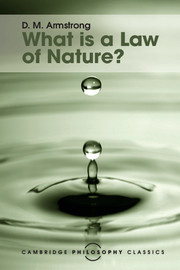Book contents
- Frontmatter
- Dedication
- Contents
- Preface to this edition
- Acknowledgements
- Part I A critique of the Regularity theory
- 1 Introductory
- 2 Critique of the Regularity theory (1): The problem of accidental uniformities
- 3 Critique of the Regularity theory (2)
- 4 Critique of the Regularity theory (3)
- 5 Can the Regularity theory be sophisticated?
- Part II Laws of nature as relations between universals
- Conclusions
- Works cited
- Index
2 - Critique of the Regularity theory (1): The problem of accidental uniformities
from Part I - A critique of the Regularity theory
Published online by Cambridge University Press: 05 July 2016
- Frontmatter
- Dedication
- Contents
- Preface to this edition
- Acknowledgements
- Part I A critique of the Regularity theory
- 1 Introductory
- 2 Critique of the Regularity theory (1): The problem of accidental uniformities
- 3 Critique of the Regularity theory (2)
- 4 Critique of the Regularity theory (3)
- 5 Can the Regularity theory be sophisticated?
- Part II Laws of nature as relations between universals
- Conclusions
- Works cited
- Index
Summary
Laws of nature characteristically manifest themselves or issue in regularities. It is natural, therefore, in Ockhamist spirit, to consider whether laws are anything more than these manifestations.
When philosophers hear the phrase ‘Regularity theory’ they are inclined almost automatically to think of a Regularity theory of causation. It is important, therefore, to be clear at the outset that what is being considered here is a Regularity theory of laws.
The Regularity theory of causation appears to be a conjunction of two propositions: (1) that causal connection is a species of law-like connection; (2) that laws are nothing but regularities in the behaviour of things. It is possible to deny the truth of (1), as Singularist theories of causation do, and then go on either to assert or to deny the truth of (2). Alternatively, (1) can be upheld, and either (2) asserted (yielding the Regularity theory of causation), or (2) denied. The reduction of cause to law, and the reduction of law to regularity, are two independent doctrines. They can be accepted or rejected independently.
It therefore appears that the Regularity theory of causation entails the Regularity theory of laws of nature, because the latter theory is a proper part of the former. By the same token, the Regularity theory of laws of nature fails to entail the Regularity theory of causation. Our concern is with the Regularity theory of law.
The Naive Regularity theory of law
There are different versions of the Regularity theory. Effective criticisms of one version may fail to be effective criticisms of another, leading to a certain amount of confusion. George Molnar (1969) provides us with a good strategy in this situation. He begins by outlining a theory which he calls the Regularity theory of laws of nature, but which I shall call the Naive Regularity theory. He then considers an important argument against such a theory advanced by William Kneale, an argument from unrealized physical possibilities. Molnar claims that Kneale's argument succeeds against the theory which he, Molnar, has outlined. However, numerous modifications of this theory can be proposed, with the object of meeting Kneale's and other criticisms. Molnar therefore goes on to consider whether the theory can be rescued from Kneale's attack by means of judicious modifications which still respect the spirit of the theory.
- Type
- Chapter
- Information
- What is a Law of Nature? , pp. 10 - 21Publisher: Cambridge University PressPrint publication year: 2016

